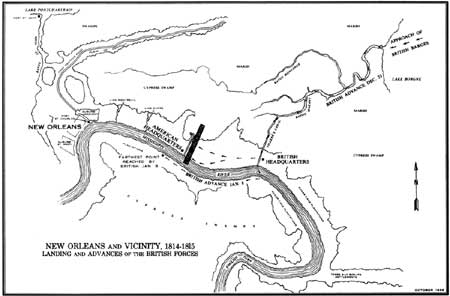|
CHALMETTE National Historical Park |
 |

(click on image for an enlargement in a new window)
The Battle of Lake Borgne
The Americans began receiving warnings as the British fleet approached Louisiana. One of these, an anonymous letter from Pensacola dated December 5, 1814, was directed to the American naval commander, Commodore D. T. Patterson. When the British forces arrived off the Louisiana coast on December 9, Patterson sent Lt. Thomas Ap. Catesby Jones with 5 gunboats, 1 tender, and a dispatch boat to watch the enemy. These boats played a sort of grim, nautical hide-and-seek with British warships among the islands along the coast until December 13. On that date, the Americans in the gunboats saw a British flotilla approaching. The Americans tried to withdraw to Petit Coquilles, an entrance to Lake Pontchartrain, where a fort could help them defend themselves. Unfortunately the tide was against them and the water was shallow. The wind died down about 1 a. m. on the 14th; so they had to anchor in open water near the west end of Malheureux Island in Lake Borgne. There they remained.
Four of the gunboats in the American squadron had 5 guns each and the fifth had 3. They had crews of 31 to 41 men. At dawn on December 14, 1814, the Americans saw the British barges carrying about 1,200 men lined up to attack them. Each barge had a carronade, or short cannon, in its bow.
When the becalmed gunboats opened fire, the barges were out of reach. As they came within range, the barges separated into three divisions, pushed forward, and began a lively return fire with their carronades. Closing in, the British boarded the American gunboats. In hand-to-hand fighting with muskets and bayonets, pikes and cutlasses the greatly outnumbered Americans were overpowered.
The British lost 17 killed and 77 wounded; the Americans lost 6 killed and 35 wounded. In this battle, the British won control of the lakes. Jackson's "eyes" for watching them were lost. New Orleans became panic-stricken.
If people had formerly been surprised at Jackson's energy in spite of his illness, they were now astounded. He was on the Plain of Gentilly when news of the loss of the gunboats reached him. He galloped to his headquarters on Royal Street and dictated orders steadily for a day and a night, even though his illness forced him to lie on a sofa much of the time. Express letters to Generals William Carroll, John Coffee, and John Thomas ordered them to hasten to New Orleans with their forces. The militia went into active service and moved to the threatened points. Every able-bodied man, British subjects only excepted, was called to do his duty. When the legislature hesitated to suspend the writ of habeas corpus, Jackson proclaimed martial law. Panic subsided. The city became an armed camp.
Up to now, the American commander had stubbornly refused to accept the services of the Baratarians, whom he called "hellish banditti." Several prominent Louisianans had tried in vain to persuade him that the pirates would be useful allies. Now Jean Lafitte called on Jackson and offered his services. Though what passed between the two probably never will be known, Jackson accepted Lafitte's offer. Artillery detachments were formed under Dominique You and Renato Beluche. Other Baratarians joined various units of the defending forces. For the time being, the pirates became patriots.
When the news that the gunboats had been captured reached him, General Coffee's Brigade was encamped a few miles above Baton Rouge. Leaving most of the brigade's baggage, Coffee selected the stronger men of his command. They traveled 135 miles in a little more than 3 days and arrived in New Orleans on the 20th.
Other reinforcements were arriving almost daily from the militia of Louisiana, Mississippi, and Tennessee. On the way down the rivers from Nashville, General Carroll's Tennesseans had overtaken some of the boats carrying arms and munitions. Taking this material, Carroll armed and drilled his men on the flatboats. When they reached the threatened city on December 22, they were well enough trained to defend it against the approaching British forces.

|
|
Last Modified: Mon, Dec 2 2002 10:00:00 am PDT |


